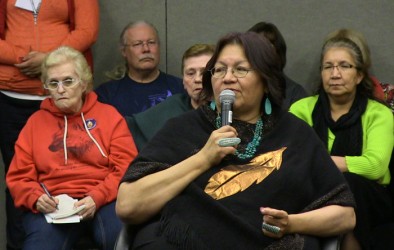Article Origin
Volume
Issue
Year
Sometimes emotional trauma emerges years after the fact. This was the case for Margaret Larocque. The Cree woman was in four different residential schools over the course of nine years.
Like many residential school survivors, she was taken from her community at a young age. “I remember being so traumatized when I first had to leave because I did not know the English language or anything about the schools,” she said. “My first year was probably the toughest year. In my first year I got every sickness imaginable. To this day I still have some problems in my balance due to some ear infections I had that were not taken care of properly.”
Larocque had to develop her own set of survival skills to get through life in the boarding schools. “In order to survive emotionally I had to build all these walls around me. I had to adjust to living with a whole bunch of people with strange customs. I had to adjust to eating food that was very different than food I ate, the processed food. For me, that established lifelong bad eating habits.”
Relating to people became difficult.
“As I got older it took me a long time to break down those walls and barriers I had put there to protect myself. It wasn’t until I was an early adult that I started recognizing what happened. The Roman Catholic Church was used as a tool of the colonizer to turn us into white people. I was a tool of the colonizer.”
In addition to struggling with her own emotional health and cultural identity as a result of residential schools, Larocque had to deal with the long term effects of sexual abuse by a priest during Catechism classes. “I carried that shame for years because I thought I was bad. It took me a long time to even start talking about my experience with the priest and how that affected my relationships. I hated older white men because of that.”
Larocque did have some positive experiences at residential school.
“When I was in some of the schools I got to meet a lot of people and to this day I know a lot of people from a lot of places. A lot of really good soccer and hockey players came from there. I left boarding school in Grade 8 and went to a white school and people recognized that I had really good sports skills. I was always the first to be picked for a team, which was a good feeling.”
However, as she got older Larocque began to experience emotional setbacks. She was angry at her mother who was not able to be there emotionally for her. She also watched some of her former schoolmates became alcoholics or ended up on the streets. One disappeared on Vancouver’s east side.
Larocque is an example of resilience. She went to university and earned a degree in social work. Today, she continues to visit her home community and observes the effects of the residential schools on the people there, particularly in terms of lateral violence by people “in leadership positions after being through all of these traumatic experiences. I have seen the use of power and energies against people.”
Still, going home is a positive experience for Larocque. “I am happy when I got home and people are happy to see me. My spirit feels good to be back home because it really is my history.”
- 2988 views

